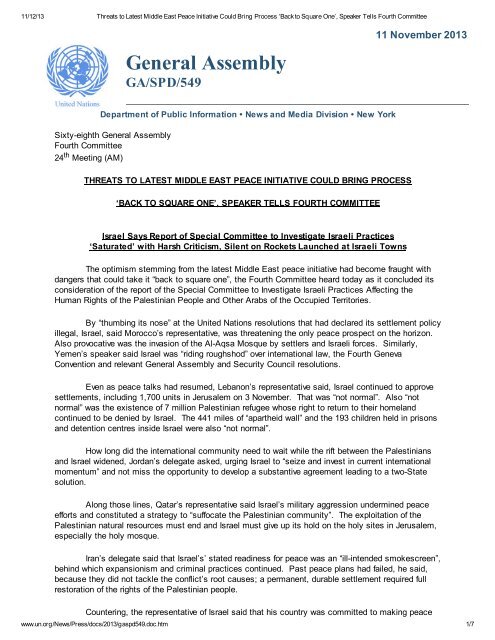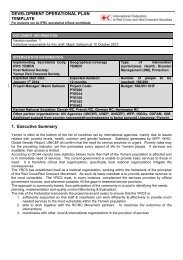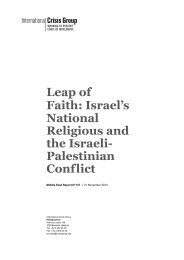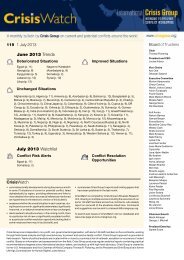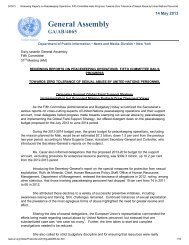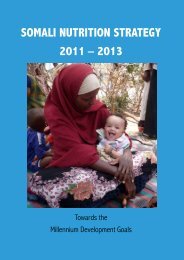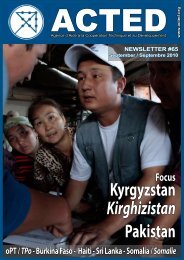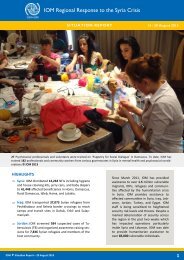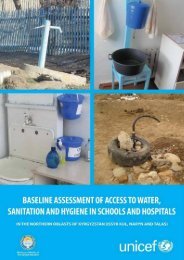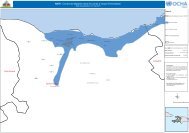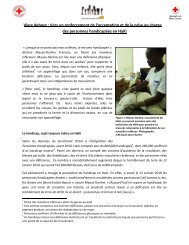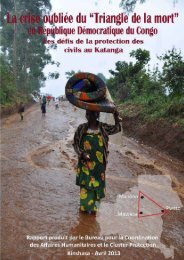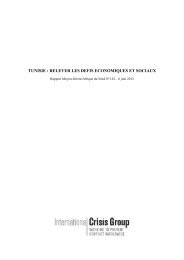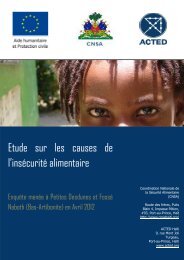Download PDF - ReliefWeb
Download PDF - ReliefWeb
Download PDF - ReliefWeb
Create successful ePaper yourself
Turn your PDF publications into a flip-book with our unique Google optimized e-Paper software.
11/12/13 Threats to Latest Middle East Peace Initiative Could Bring Process ‘Back to Square One’, Speaker Tells Fourth Committee<br />
General Assembly<br />
GA/SPD/549<br />
11 November 2013<br />
Department of Public Information • News and Media Division • New York<br />
Sixty-eighth General Assembly<br />
Fourth Committee<br />
24 th Meeting (AM)<br />
THREATS TO LATEST MIDDLE EAST PEACE INITIATIVE COULD BRING PROCESS<br />
‘BACK TO SQUARE ONE’, SPEAKER TELLS FOURTH COMMITTEE<br />
Israel Says Report of Special Committee to Investigate Israeli Practices<br />
‘Saturated’ with Harsh Criticism, Silent on Rockets Launched at Israeli Towns<br />
The optimism stemming from the latest Middle East peace initiative had become fraught with<br />
dangers that could take it “back to square one”, the Fourth Committee heard today as it concluded its<br />
consideration of the report of the Special Committee to Investigate Israeli Practices Affecting the<br />
Human Rights of the Palestinian People and Other Arabs of the Occupied Territories.<br />
By “thumbing its nose” at the United Nations resolutions that had declared its settlement policy<br />
illegal, Israel, said Morocco’s representative, was threatening the only peace prospect on the horizon.<br />
Also provocative was the invasion of the Al-Aqsa Mosque by settlers and Israeli forces. Similarly,<br />
Yemen’s speaker said Israel was “riding roughshod” over international law, the Fourth Geneva<br />
Convention and relevant General Assembly and Security Council resolutions.<br />
Even as peace talks had resumed, Lebanon’s representative said, Israel continued to approve<br />
settlements, including 1,700 units in Jerusalem on 3 November. That was “not normal”. Also “not<br />
normal” was the existence of 7 million Palestinian refugee whose right to return to their homeland<br />
continued to be denied by Israel. The 441 miles of “apartheid wall” and the 193 children held in prisons<br />
and detention centres inside Israel were also “not normal”.<br />
How long did the international community need to wait while the rift between the Palestinians<br />
and Israel widened, Jordan’s delegate asked, urging Israel to “seize and invest in current international<br />
momentum” and not miss the opportunity to develop a substantive agreement leading to a two-State<br />
solution.<br />
Along those lines, Qatar’s representative said Israel’s military aggression undermined peace<br />
efforts and constituted a strategy to “suffocate the Palestinian community”. The exploitation of the<br />
Palestinian natural resources must end and Israel must give up its hold on the holy sites in Jerusalem,<br />
especially the holy mosque.<br />
Iran’s delegate said that Israel’s’ stated readiness for peace was an “ill-intended smokescreen”,<br />
behind which expansionism and criminal practices continued. Past peace plans had failed, he said,<br />
because they did not tackle the conflict’s root causes; a permanent, durable settlement required full<br />
restoration of the rights of the Palestinian people.<br />
Countering, the representative of Israel said that his country was committed to making peace<br />
www.un.org/News/Press/docs/2013/gaspd549.doc.htm 1/7
11/12/13 Threats to Latest Middle East Peace Initiative Could Bring Process ‘Back to Square One’, Speaker Tells Fourth Committee<br />
with the Palestinian people, and was ready to make “a historic compromise” for a demilitarized<br />
Palestinian State living side-by-side with the Jewish State of Israel. The release of 26 Palestinian<br />
prisoners two weeks ago was a demonstration of that willingness. Instead of spreading lies and hatred,<br />
it was time to seize the moment and work towards a lasting solution.<br />
Instead, he said, the Special Committee’s report furthered “a biased and one-sided narrative of<br />
the conflict”. Though saturated with harsh criticism of Israel, it conveniently ignored the rockets and<br />
mortars that had been launched towards Israeli towns, as well as the human rights violations by<br />
Palestinians against Palestinians. Israel refused to cooperate with a prejudiced body, and today’s<br />
meeting was another window into the “theatre of the absurd”.<br />
Further, many positive developments had taken place in the West Bank and Gaza over the past<br />
year, he added, with hundreds of thousands of tons of goods passed into the Gaza Strip each month.<br />
However, the recent discovery of a tunnel from Gaza to an Israeli community, built with 500 tons of cement<br />
earmarked for construction, showed that those materials were being misused. Israel was also<br />
strengthening economic cooperation with Palestinians by issuing work permits and improving the tax<br />
collection interface, thereby increasing the Palestinian Authority’s revenues.<br />
Also speaking today were the representatives of Egypt, Iraq, Libya, Kuwait, United Arab<br />
Emirates, Tunisia, Lesotho, Mali, Sudan, and Cuba.<br />
Speaking in exercise of the right of reply were the observer for the State of Palestine and the<br />
representatives of Israel and Lebanon.<br />
The Committee will meet again at 10 a.m. on Thursday, 14 November, to conclude its work.<br />
Background<br />
The Fourth Committee (Special Political and Decolonization) met today to conclude its debate<br />
on the work of the Special Committee to Investigate Israeli Practices Affecting the Human Rights of the<br />
Palestinian People and Other Arabs of the Occupied Territories.<br />
Statements<br />
SONIA SUGHAYAR ( Jordan) said that Israel needed to “seize and invest in current national<br />
momentum” to move forward with the Palestinians and not miss the opportunity to develop a<br />
substantive agreement with them, leading to a two-state solution. Jordan had exerted immense efforts<br />
to resolve that conflict and develop a better understanding between the two sides, so as to foster<br />
engagement on the issues of borders, security, refugees and Jerusalem. Jordan condemned the<br />
assaults against Jerusalem’s holy sites, the building of more settlements and other activities<br />
undermining an end to the Palestinian-Israeli conflict. Such policies seriously threatened ongoing<br />
negotiations and risked the goal for peace. “How long does the international community need to wait<br />
while the rift between the Palestinians and Israel is widening?” she asked. It was the responsibility and<br />
collective duty of States around the world to provide a better future and positive environment for the<br />
current and future generations of Palestinians.<br />
BENJAMIN SHARONY ( Israel) said that his country was committed to making peace with the<br />
Palestinian people and had demonstrated that two weeks ago by releasing 26 Palestinian prisoners<br />
convicted of murdering Israelis. Though that was a traumatic event for Israelis, his country had taken<br />
that step because it was willing to make painful compromises to reach an agreement. But today’s<br />
meeting was yet another window into the “theatre of the absurd”. The report of the Special Committee<br />
furthered a biased and one-sided narrative of the conflict and advanced a clear political agenda aimed at<br />
discrediting Israel.<br />
The report, he added, was saturated with harsh criticism of Israel but conveniently forgot to<br />
www.un.org/News/Press/docs/2013/gaspd549.doc.htm 2/7
11/12/13 Threats to Latest Middle East Peace Initiative Could Bring Process ‘Back to Square One’, Speaker Tells Fourth Committee<br />
mention the 10,000 rockets and mortars that had been launched towards his country from the Gaza<br />
Strip since 2001. The Special Committee also chose to completely ignore the human rights violations<br />
by Palestinians against their own people, such as the persecution of the Palestinian homosexual<br />
community by the Palestine Liberation Organization and Hamas. There was abundant evidence that<br />
the Committee’s conclusions were predetermined. Therefore, Israel continued to refuse to cooperate<br />
with a body that was prejudiced from the outset.<br />
Many positive developments, however, had taken place in the West Bank and Gaza over the<br />
past year, he said, noting that, every month, trucks carrying hundreds of thousands of tons of goods<br />
passed from Israel into Gaza. Israel also cooperated with several United Nations agencies and<br />
international organizations to advance development projects in Gaza. A few weeks ago, Israeli Defense<br />
Forces had discovered a two-kilometre tunnel from Gaza to an Israeli community, built with 500 tons of<br />
cement that had been earmarked for peaceful construction. Instead of using the materials to build a<br />
better future for the Palestinian people, the leadership in Gaza was committed to destroying the State<br />
of Israel.<br />
Nevertheless, economic cooperation between Israel and the Palestinians was strengthening, he<br />
said, citing a new computer interface, which integrated Israeli and Palestinian customs and tax<br />
collections systems and would increase the Palestinian Authority’s revenues from direct customs<br />
collections. In August, Israel had issued an additional 5,000 work permits to Palestinians, and it was<br />
also working to improve the movement of people and goods in Judea and Samaria. Israel also supplied<br />
those places with more than 1,400 million gallons of water per year. None of those statistics or<br />
achievements was to be found in the Special Committee’s report.<br />
Further, he said, it was absurd to hear some of the world’s most oppressive tyrannies lecture<br />
the Middle East’s only democracy on human rights and rule of law. It was easier to point fingers in<br />
New York than to spend time improving human rights practices at home. Israel was ready to make a<br />
historic compromise to realize the creation of a demilitarized Palestinian State living side-by-side with<br />
the Jewish state of Israel. It was time to seize the moment and work towards a lasting solution, not<br />
spread lies and foster hate.<br />
KAHLID AL-MAHMOUD ( Qatar) said that his country had always supported the Palestinians’<br />
right to establish an independent State with holy Jerusalem as its capital. Qatar condemned a wide<br />
range of illegal policies of the Israelis, especially the treatment of the Palestinian detainees,<br />
construction of the wall and settler violence. It was the “strategy of the Israelis to suffocate the<br />
Palestinian community”. He stressed the need to end the exploitation by Israel of the Palestinian<br />
natural resources as well as their settlement activities and hold on Jerusalem’s holy sites, especially<br />
the holy mosque. Israel’s military aggression undermined efforts to help achieve a comprehensive and<br />
just solution. Last year, the United Nations had established Palestine as an observer State, and Qatar<br />
emphasized that Israel’s continued rejection of the Palestinian State did not help the peace<br />
negotiations between the two countries.<br />
SOUMIA BOUHAMIDI ( Morocco) said that the optimism resulting from the United States’-led<br />
peace initiative had become fraught with dangers that could take the process back to square one. The<br />
international community must not become oblivious to the conditions of the Palestinian people. It was<br />
not possible to talk of human rights without talking about the settlement policy that had turned the lives<br />
of thousands of Palestinians into a living nightmare. Israel’s policy of expanding the illegitimate<br />
settlements was threatening the only peace prospect on the horizon. Though the United Nations had<br />
declared those settlements illegal, Israel continued to “thumb its nose” at the relevant resolutions.<br />
Jerusalem remained the number-one target of that policy, with special efforts to change its cultural<br />
heritage and demographic composition through restrictions imposed on the Palestinian population.<br />
Morocco was especially concerned about the continued invasion of the Al-Aqsa Mosque by settlers and<br />
Israeli forces, which was a provocative and escalatory act that showed lack of respect for the peace<br />
process.<br />
MOHAMED SARWAT SELIM ( Egypt), associating himself with the Non-Aligned Movement,<br />
www.un.org/News/Press/docs/2013/gaspd549.doc.htm 3/7
11/12/13 Threats to Latest Middle East Peace Initiative Could Bring Process ‘Back to Square One’, Speaker Tells Fourth Committee<br />
said the Special Committee had clearly documented that the situation of the Palestinians in the<br />
Occupied Territory remained dire. Egypt was alarmed by the report’s outline of violations committed by<br />
the occupying Power, which acted “above the law” in its pattern of illegal operations against the<br />
Palestinians. Egypt deplored the conditions of the Palestinians and demanded that Israel abide by the<br />
Committee’s recommendations, including the end of the Gaza blockade, the cessation of its disregard<br />
of Palestinians’ rights and an end to the violations in the Syrian Golan, especially the exploitation of its<br />
natural resources. The occupying Power must implement the Special Committee’s resolutions, as its<br />
unlawful actions constituted an infraction of international law. Egypt also demanded that Israel adhere<br />
to the Security Council resolution 497 (1981) and completely withdraw from the Syrian Golan.<br />
CAROLINE ZIADE ( Lebanon) said it was “not normal” that 7 million out of 12 million<br />
Palestinians were refugees inside Palestine and host countries, including Lebanon, while Israel<br />
continued to defy their right to return to their homeland. It was not normal that, while talks had<br />
resumed, Israelis continued to approve settlements, including 1,700 units in Jerusalem on 3 November.<br />
It was not normal that 441 miles of “apartheid wall” had been constructed, that more than 7,000<br />
Palestinians had been killed by Israeli forces and that 25,000 Palestinians houses had been<br />
demolished in the West Bank. It was not normal that, as of June, 193 children, including 41 below the<br />
age of 16, were held in prisons and detention centres inside Israel in blatant violation of the Fourth<br />
Geneva Convention. Even those who said that Israel was not “physically present” in Gaza could not<br />
deny that it was controlling every aspect of Palestinian life. The numbers spoke for themselves: 70 per<br />
cent of the Palestinian population depended on international aid and 90 per cent on water unfit for<br />
human consumption. Lebanon recognized the value of the Secretary-General’s 30 October statement,<br />
in which he deplored the announced plans for additional Israeli settlements in the West Bank, stating<br />
that it was “contrary to international law” and constituted an “obstacle to peace”.<br />
MOHAMMAD REZA SAHRAEI ( Iran) listed Israeli policies, which he said violated the<br />
fundamental human rights and dignity of the Palestinian people, and noted the deterioration in the<br />
humanitarian and economic situation in Gaza. He reiterated his condemnation of Israel’s continued<br />
illegal settlement activities, which he said were grave breaches of international law and the Fourth<br />
Geneva Convention. He believed Israeli Stated readiness for peace was an “ill-intended smokescreen”,<br />
behind which expansionism and criminal practices continued. The fundamental problem to be solved<br />
was the illegal occupation of Palestinian and Arab territory. Past peace plans had failed because they<br />
did not tackle the conflict’s root causes; a permanent, durable settlement required full restoration of the<br />
rights of the Palestinian people.<br />
WALEED AL-SAIYANI ( Yemen) said that the report of the Special Committee proved how the<br />
Israeli Government’s inhumane practices had led to the deterioration of the human rights and socioeconomic<br />
situations of the Palestinians. Israel was “riding roughshod” over international law, the Fourth<br />
Geneva Convention and relevant General Assembly and Security Council resolutions. Israel’s policy of<br />
aggression continued in prisons, with injustices aimed at Palestinian detainees and through the<br />
embargo imposed on Gaza. Yemen supported the legitimate Palestinian cause of the establishment of<br />
an independent State with Al-Quds as its capital. Israel must withdraw from all occupied Arab<br />
territories and the international community must pressure the Israeli Government to end its blatant<br />
violations of international law.<br />
WILLIAM ISHAYA ODISHO (Iraq), associating with the Non-Aligned Movement, urged the<br />
Special Committee, in accordance with its mandate, to continue its work under strenuous conditions<br />
and to present its reports. Clearly, Israel, because of its refusal to comply with the Committee,<br />
maintained its cover-up of its activities, including its plunder of resources in the Syrian Golan, the<br />
settlements in the Occupied Palestinian Territory, and the violations of Palestinian human rights.<br />
Israel’s other policies, especially the building of the wall, detentions without impunity or trial, including<br />
of migrant children, and its control of the Syrian Golan since 1981 aimed to “contain the State of<br />
Palestine”. The efforts of the United Nations, the Security Council and the Special Committee were<br />
“null and void” until Israel heeded international law and discontinued its illegal practices within the<br />
Occupied Palestinian Territory.<br />
www.un.org/News/Press/docs/2013/gaspd549.doc.htm 4/7
11/12/13 Threats to Latest Middle East Peace Initiative Could Bring Process ‘Back to Square One’, Speaker Tells Fourth Committee<br />
IMAD TAGURI ( Libya) said that Israel was blatantly continuing its settlement policies and had<br />
solicited tenders for more settlements in clear violation of international law. Libya condemned that<br />
policy, which impeded all efforts for peace in the region and hindered the establishment of a Palestinian<br />
State. The administrative detention of Palestinians was now an established practice of the Israeli<br />
authorities, and included minors, who were mistreated. The destruction of religious sites and the<br />
demolition of houses by the Israeli occupation authorities also continued, especially in East Jerusalem<br />
where Israel was pursuing a policy of Judaization.<br />
ABDULAZIZ ALJARALLAH ( Kuwait) said the Committee’s report “clearly and candidly” outlined<br />
Israel’s human rights violations in the occupied territories and, as a result, the Middle East community<br />
continued to suffer from insecurity. The report outlined some of those abuses, including Israel’s arrest<br />
of Palestinians and the disregard of their rights, the systematic construction of the settlements, building<br />
of the wall and the confiscation of Palestinian farmland. Kuwait called on Israel to cease its violent acts<br />
against the Palestinians and hold the violators accountable for those acts. Kuwait demanded the<br />
restoration of the Palestinian peoples’ full rights, the release of the detainees and an investigation of<br />
their conditions be conducted. Also crucial was that the Gaza blockade be lifted and that Security<br />
Council resolution 497 (1981) be upheld. Until Israel abided by the Special Committee’s<br />
recommendations and allowed the Palestinians to establish its State with Al-Quds as its capital, the<br />
international community’s efforts to achieve “just and lasting” peace in the Middle East would be<br />
continuously compromised.<br />
ABDULLA AL KAABI ( United Arab Emirates) said that the report of the Special Committee<br />
clearly reflected the magnitude of Israel’s violations of the human rights of the Palestinian people.<br />
Despite the lack of cooperation by the Israeli Government, testimonies by witnesses and media reports<br />
had demonstrated the many unacceptable infringements and injustices perpetrated by Israel. The<br />
report indicated an increase in the number of demolitions of Palestinian structures, including homes.<br />
Israel was also exploiting the natural resources of the Syrian Golan, including its water resources, and<br />
had prevented the population from reuniting with their families while leaving thousands of mines in that<br />
area. The United Arab Emirates reaffirming the international community’s basic responsibilities to<br />
protect the Occupied Palestinian People and hoped that the General Assembly would strengthen the<br />
mandate of the Special Committee.<br />
MOHAMED KHALED KHIARI (Tunisia), associating himself with the Non-Aligned Movement,<br />
said Israeli practices continued “unabated”, with provocative declarations, obstructive policies and<br />
settlement construction, adversely affecting Palestinian State institutions. Israeli policies jeopardized<br />
the viability of a two-State solution, and he urged the international community to act against their<br />
“flagrant breach of the norms of international law, international resolutions and the fundamental tenets of<br />
the peace process”. He condemned attacks on Palestinians and efforts to Judaize Jerusalem by<br />
altering its Islamic sites and demography. He urged the international community to support Palestinian<br />
State institutions, which faced a severe financial crisis, and called for a definitive decision to fully lift the<br />
Gaza blockade. There was reason for hope in the General Assembly resolution of 29 November 2012,<br />
which gave Palestine “non-Member observer State” status at the United Nations, and in resumption of<br />
direct negotiations between Israel and Palestine. The international community should support those<br />
talks, which should lead to a comprehensive final settlement.<br />
KELEBONE A. MAOPE (Lesotho), associating himself with the Non-Aligned Movement, said<br />
his delegation was highly concerned about the high number of Palestinian prisoners, including children<br />
under the age of 12, who remained in Israel’s detention facilities under poor conditions. Some of the<br />
children in detention had been illegally abducted from their homes by Israeli law enforcement agencies<br />
in total disregard of the Geneva Convention. In detention were 500 prisoners who were subjected to<br />
abuses, including denial of family visits, solitary confinement and negligent medical treatment. The<br />
“occupying Power” must ensure sufficient hygiene and public health standards, as well as provision of<br />
food and medical care to the population under occupation, including prisoners. Further stressing that<br />
the conflict between Israel and Palestine must end, he urged negotiations based on respect of the<br />
sovereign equality and recognition of rights and legitimate fears of all parties and called on the<br />
international community to encourage a resolution of differences through peaceful dialogue.<br />
www.un.org/News/Press/docs/2013/gaspd549.doc.htm 5/7
11/12/13 Threats to Latest Middle East Peace Initiative Could Bring Process ‘Back to Square One’, Speaker Tells Fourth Committee<br />
DIANGUINA DIT YAYA DOUCOURE ( Mali), associating with the Non-Aligned Movement, said<br />
that the report was complete and accurate in its record of Israel’s violations of Palestinian human<br />
rights. The seriousness of those acts had impeded worldwide efforts to establish peace in the Middle<br />
East for “six decades now”. Mali supported any approaches to put in place an end to the abuse of the<br />
detainees, settlement construction in the West Bank, the Gaza blockade, and occupation of the Syrian<br />
Golan. “The time has come,” he said, for Israel to uphold the Palestinians’ right to sovereignty and<br />
enact Security Council resolution 497 (1981), establishing the democratic and territorial rights of the<br />
people of the Syrian Golan. Israel’s swift lifting of the Gaza blockade giving Palestinians the ability to<br />
work, attain an education and achieve socio-economic development would establish trust and a<br />
framework for peace. The immediate task was to return Palestine to its condition that existed before<br />
the 1967 war, thus establishing security in the region.<br />
ABUZIED SHAMSELDIN (Sudan), associating himself with the Non-Aligned Movement, said<br />
that the report of the Special Committee had classified all the violations of human rights and<br />
international law perpetrated by the Israeli authorities, among which were killings, arbitrary detentions,<br />
home demolitions, and settlement construction. In addition to contravening international law and<br />
resolutions, those violations also jeopardized the two-State solution and created adverse social and<br />
political conditions in the Palestinian Territory. The blockade imposed on the Gaza Strip made the<br />
enclave an intolerable place to live. It was time to end the Israeli occupation of Palestinian Territory, and<br />
Sudan supported every step towards a comprehensive and lasting peace that would eventually lead an<br />
independent Palestinian State with East Jerusalem as its capital.<br />
REBECA HERNANDEZ TOLEDANO (Cuba), associating himself with the Non-Aligned<br />
Movement, said that the Special Committee’s conclusions confirmed no support by Israel for<br />
implementation of United Nations resolutions towards a peaceful settlement of the conflict. The 5,000<br />
detainees held in 22 prisons in Israel and Palestine, the 197 children arrested by the Israelis as of June,<br />
the 312 settler attacks on Palestinians, and the 492 Palestinians displaced with the support of the Israeli<br />
armed forces affirmed its efforts to control Palestine. Only an end to the occupation, the liberation of the<br />
impoverished people in Gaza, and the cessation of provocative Israeli military activities would support the<br />
international community’s efforts to launch positive negotiations. The Security Council, however,<br />
remained powerless because one of its members maintained its threat of veto. Israel continued to seek<br />
to impose its Government on the Palestinians, which confirmed its violations of international law, State<br />
agreements and United Nations resolutions. Cuba recommended recognition of Palestinian sovereignty<br />
and the return of Palestinian lands as the only way to a just and lasting peace.<br />
Right of Reply<br />
Speaking in exercise of right of reply, the observer of the State of Palestine said that the report<br />
of the Special Committee was neither biased nor one-sided. Its examination was clearly within the<br />
framework of international law and there was no distortion of truth or discrediting of Israel. The<br />
Committee had reported facts regarding the systematic and egregious violations of rights by Israel,<br />
some of which amounted to war crimes. Yet, Israel continued to justify those violations by attacking<br />
those who spoke out against them.<br />
The Israeli delegate, she added, during his statement today, had not referred to or recognized<br />
the root of the ongoing Israeli-Palestinian conflict even once – the occupation of Palestinian lands since<br />
1967 and the subjugation of the Palestinian people. No amount of “easing restrictions” would resolve<br />
that conflict. “Lessening the crime while still committing the crime” was flawed logic. Only ending the<br />
occupation would enable the Palestinian people to truly know the dignity and peace they had been<br />
denied for decades. Among Israel’s many “empty and offensive pretexts” was today’s statement that<br />
ending the occupation was a compromise.<br />
The international community’s position was clear and was reflected in the statements before<br />
the Fourth Committee and Security Council, as well as the principled support in the General<br />
Assembly. That was the clear answer to Israel’s caustic arguments.<br />
www.un.org/News/Press/docs/2013/gaspd549.doc.htm 6/7
11/12/13 Threats to Latest Middle East Peace Initiative Could Bring Process ‘Back to Square One’, Speaker Tells Fourth Committee<br />
Also speaking in exercise of the right of reply, the representative of Israel said that a number of<br />
delegations were spreading lies and accusations, trying to trample on the democratic process of the<br />
Fourth Committee as they did “back home”. Their efforts would be better spent providing liberty to the<br />
women and minorities they oppressed in their own countries, rather than wasting the Committee’s<br />
valuable time. Especially remarkable was the audacity of Lebanese delegate, given the corruption and<br />
violence in her country. The representative of Lebanon must take a look at the refugee camps in her<br />
country where Palestinians were consistently discriminated against.<br />
Also speaking in exercise of the right of reply, the representative of Lebanon said that her<br />
country had never politicized the discussion or deviated from it. Since Israeli practices was the topic of<br />
the day, her delegation had limited itself to the reports submitted by the Secretary—General. Lebanon<br />
was a founding member of the United Nations and a host country to thousands of Palestinians who had<br />
fled because of Israeli occupation and violence. That was demonstrated by facts submitted, not only to<br />
this Committee, but to various other United Nations bodies.<br />
* *** *<br />
For information media • not an official record<br />
www.un.org/News/Press/docs/2013/gaspd549.doc.htm 7/7


